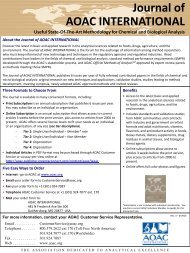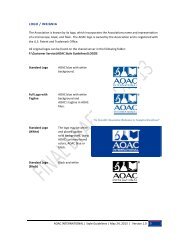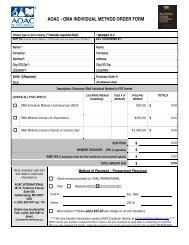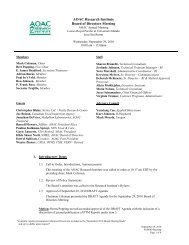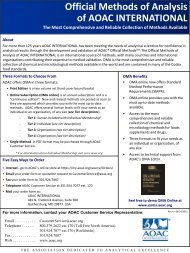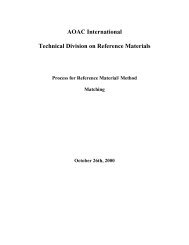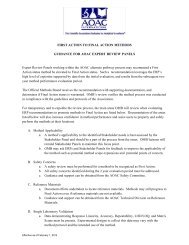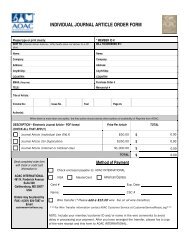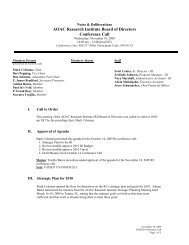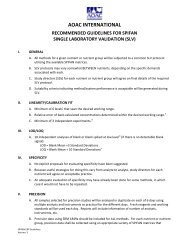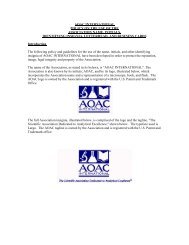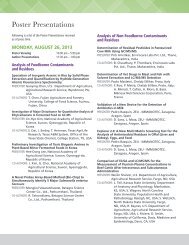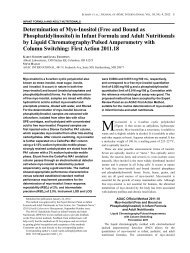Policies & Procedures - AOAC International
Policies & Procedures - AOAC International
Policies & Procedures - AOAC International
You also want an ePaper? Increase the reach of your titles
YUMPU automatically turns print PDFs into web optimized ePapers that Google loves.
<strong>AOAC</strong> Research Institute<br />
PERFORMANCE TESTED METHODS SM<br />
PROGRAM<br />
POLICIES and PROCEDURES<br />
Notice:<br />
<strong>AOAC</strong> Research Institute reserves<br />
the right to modify the program at any<br />
time. Participants are required<br />
to comply with the current program in<br />
effect at time of initial application<br />
or renewal.<br />
© 2009 - <strong>AOAC</strong> Research Institute
© 2009 - <strong>AOAC</strong> Research Institute<br />
TABLE OF CONTENTS<br />
1. Purpose<br />
2. Background<br />
3. Overview<br />
4. <strong>Procedures</strong><br />
4.1 Consulting<br />
4.1.1 Consulting Application Package<br />
4.1.2 Validation Outline<br />
4.1.3 Payment, Delivery of the Validation Outline, and On-Going<br />
Support<br />
4.1.4 Waiver<br />
4.2 Performance Tested Methods SM Application<br />
4.2.1 Performance Tested Methods SM Application Review<br />
4.2.2 Checklist<br />
4.2.3 Certification of QA Program and QC Practices<br />
4.2.4 Project Manager<br />
4.2.5 Invoicing<br />
4.2.6 Refunds<br />
4.3 Independent Testing Site<br />
4.3.1 Selection of Independent Testing Site<br />
4.3.2 Contracts and Invoicing<br />
4.3.2.1 Independent Testing Site Contract<br />
4.3.2.2 Agreement for Independent Testing<br />
4.3.2.3 Invoices<br />
4.3.3 Logistics, Scheduling & Training<br />
4.3.4 Independent Testing Site Report<br />
4.4 Internal Site Study<br />
4.5 Method Validation Study Report and Review<br />
4.6 Selecting Reviewers<br />
4.7 Criteria for Granting Performance Tested Methods SM Status<br />
4.8 Certificate<br />
4.8.1 4.8.1 Certificates Initially Granted Before October 1 st of Any<br />
Given Year<br />
4.8.2 Certificates Initially Granted On or After October 1 st of Any<br />
Given Year<br />
4.9 Certification Mark<br />
4.10 Certification Mark License Agreement<br />
5. Performance Tested Methods SM Status<br />
6. Re-Certification (Annual Review) Process<br />
6.1 Re-Certification Review<br />
6.2 Suspension and Late Fees<br />
6.3 Re-Instatement of Suspended Test Kits<br />
6.4 Revocation<br />
6.5 Re-Instatement of Revoked Test Kits
© 2009 - <strong>AOAC</strong> Research Institute<br />
7. Test Kit Modifications<br />
7.1 Notification<br />
7.2 Modification Review Levels and Administrative Fees<br />
7.3 Approval of Modifications<br />
8. Reviewed and Recognized Methods<br />
9. Complaints<br />
9.1 Licensee Complaints<br />
9.2 User Complaints<br />
10. Appeals Process<br />
10.1 Right to and Basis for Appeal<br />
10.2 Appeal Application<br />
10.3 Appeals Panel<br />
10.4 Appeals Process<br />
10.5 Preliminary Finding<br />
10.6 Final Decision<br />
10.7 Expenses<br />
10.8 Exceptions to the <strong>Procedures</strong><br />
11. Program Administration<br />
11.1 <strong>AOAC</strong> Research Institute<br />
11.2 <strong>AOAC</strong> Research Institute Staff and Reviewer and Duties<br />
11.2.1 Managing Director Responsibilities<br />
11.2.2 Program Manager Responsibilities<br />
11.2.3 Technical Project Managers<br />
11.2.4 Expert Reviewers<br />
11.2.5 General Referees/Topic Advisors<br />
11.3 Confidentiality<br />
10.3.1 Access to Confidential Information<br />
10.3.2 Sanctions to Release Information<br />
10.3.3 Expert Reviewers<br />
10.3.4 Contractors and Consultants<br />
10.3.5 In-House Document Handling<br />
10.3.6 Telephone Calls<br />
12. Flowcharts<br />
13. Appendices:<br />
1. Fee Schedule<br />
2. Consulting Application<br />
3. Consulting Agreement<br />
4. Consulting Service Waiver<br />
5. Performance Tested Methods SM Application Form
6. Performance Tested Methods SM Review Agreement<br />
7. Check List<br />
8. General Criteria for Independent Laboratories<br />
9. Independent Laboratory Contract<br />
10. Method Developer Agreement for Independent Testing<br />
11. Method Validation Study Report Format Example<br />
12. Package Insert Requirements<br />
13. Certificate<br />
14. Certification Mark License Agreement<br />
15. Annual Renewal Application Form<br />
16. Re-Instatement Application Form<br />
17. Method Modification Review Form<br />
18. Test Method Definitions and Modifications Guideline<br />
19. Performance Tested Methods SM Reviewed & Recognized Application<br />
20. Trade Secret Non-disclosure Policy<br />
21. Policy and Procedure on Volunteer Conflict of Interest<br />
22. Anti-Trust Policy Statement and Guidelines<br />
23. Flow Charts<br />
Form Flowchart 1: Program Overview<br />
Flowchart 2: Consulting <strong>Procedures</strong><br />
Flowchart 3: PTM Application Review<br />
Flowchart 4: Independent Test Site <strong>Procedures</strong><br />
Flowchart 5: Validation Study Report Review<br />
Flowchart 6: Post Certification Process Flowchart<br />
© 2009 - <strong>AOAC</strong> Research Institute
POLICIES and PROCEDURES<br />
<strong>AOAC</strong> Research Institute <strong>Policies</strong> and <strong>Procedures</strong><br />
1. Purpose<br />
The Performance Tested Methods SM (PTM) program provides an independent third-party<br />
review of proprietary test method performance. Test methods demonstrated to meet<br />
acceptable performance criteria are granted PTM status. Method Developers of approved<br />
PTM test methods are licensed to use the PTM certification mark. The PTM certification<br />
mark assures users that an independent assessment has found that the test method<br />
performance meets an appropriate standard for the claimed intended use.<br />
2. Background<br />
The <strong>AOAC</strong> Research Institute (RI) was incorporated in 1991 as a nonprofit subsidiary of the<br />
<strong>AOAC</strong> INTERNATIONAL (formerly know as the Association of Official Analytical Chemists).<br />
The <strong>AOAC</strong> Research Institute operates as an independent corporation with its own Board<br />
of Directors and dedicated staff.<br />
The mission of the <strong>AOAC</strong> Research Institute is to promote and carry out activities related to<br />
the development, improvement and validation of proprietary methods. A list of currently<br />
approved methods can be found at the <strong>AOAC</strong> Research Institute website at<br />
http://www.aoac.org/testkits/testedmethods.html.<br />
The <strong>AOAC</strong> Research Institute cooperates with many US and international organizations<br />
including: US Food and Drug Administration, US Department of Agriculture; US Department<br />
of Homeland Security; US Department of Defense; US Environmental Protection Agency;<br />
Canadian Food Inspection Service, Health Canada; Association française de<br />
Normalisation; Nordic Committee on Food Analysis; MicroVal; and the <strong>International</strong><br />
Organization for Standardization.<br />
The PTM program is designed to be complementary to the Official Methods of Analysis SM<br />
(OMA) program. The PTM evaluation can serve as the OMA “pre-collaborative” study for a<br />
microbiology method; or as the single laboratory validation for a chemistry method.<br />
3. Overview<br />
The PTM program has six distinct phases:<br />
1) Consulting<br />
2) PTM Application<br />
3) Method Developer Validation Study<br />
4) Independent Validation Study<br />
5) Validation Study Report<br />
6) PTM Review<br />
© 2009 - <strong>AOAC</strong> Research Institute 1
<strong>AOAC</strong> Research Institute <strong>Policies</strong> and <strong>Procedures</strong><br />
A test method may be submitted for PTM evaluation by a Method Developer, Distributor, or<br />
Certification Mark License Agreement before a test method can be granted PTM status.<br />
The PTM evaluation begins with a Consulting phase in which the Method Developer and an<br />
<strong>AOAC</strong>-RI Technical Consultant discuss and decide the aims of the validation. The type of<br />
assay, target analyte, matrices, market, and regulatory issues are all considered at this<br />
stage. The <strong>AOAC</strong>-RI Technical Consultant works with the Method Developer to prepare a<br />
Validation Outline suitable to the claimed intended use of the test method. The Validation<br />
Outline is a formal document that includes a detailed description of the Method Developer<br />
and Independent Validation Study Protocols necessary for data collection, acceptable<br />
performance criteria and report submission. The Validation Outline is reviewed by the<br />
appropriate <strong>AOAC</strong> General Referee or Topic Advisor, and once approved the final outline is<br />
provided to the Method Developer.<br />
After the Consulting phase is complete and an approved Validation Outline has been<br />
delivered, the Method Developer may choose to submit a PTM Application. Method<br />
Developers are under no obligation to submit a PTMApplication if they elect not to proceed.<br />
Method Developers may choose to spend time planning and preparing for the PTM review<br />
before submitting an application<br />
A Method Developer who decides to proceed must submit a PTM application package as<br />
per section 4.2. The application package is reviewed by the <strong>AOAC</strong> RI staff to confirm that<br />
the package is complete. The <strong>AOAC</strong>-RI Program Manager assigns an <strong>AOAC</strong>-RI Project<br />
Manager to lead the evaluation. Typically, this is the same person who served as the<br />
Technical Consultant.<br />
After the preliminary review confirms that the PTM application package is complete, the<br />
<strong>AOAC</strong> RI Project Manager identifies qualified testing sites to conduct the independent site<br />
testing. The Project Manager oversees the execution of a contract between the selected<br />
independent site, the <strong>AOAC</strong> RI, and the Method Developer. After the contract is in place,<br />
the Project Manager organizes the Independent Validation Study with the cooperation of the<br />
Method Developer.<br />
Upon completion of independent site testing, a written Independent Validation Study Report<br />
will be delivered to the Method Developer. The Method Developer shall prepare a PTM<br />
Validation Study Report per the PTM study report format provided in the Validation Outline<br />
that includes both the results from the Method Developer’s study and the Independent<br />
study.<br />
The General Referee/Topic Advisor and 2 Expert Reviewers will review the Method<br />
Validation Study Report to determine acceptability as a Performance Tested method. The<br />
Reviewers will provide recommendations to the <strong>AOAC</strong>-RI Project Manager for awarding or<br />
denying PTM status.<br />
PTM status will be granted if the performance of the test method is determined to be<br />
acceptable relative to the appropriate standard (reference method when available) for the<br />
method’s intended use claim. Once approved, the Method Developer is awarded a unique<br />
© 2009 - <strong>AOAC</strong> Research Institute 2
<strong>AOAC</strong> Research Institute <strong>Policies</strong> and <strong>Procedures</strong><br />
PTM certification number and is licensed to use the PTM certification mark, and the Method<br />
Validation Study Report is published in the Journal of the <strong>AOAC</strong> INTERNATIONAL.<br />
PTM status must be re-certified annually for as long as the Licensee elects to<br />
maintain the PTM certificate. PTM status is extended in one year increments.<br />
4. <strong>Procedures</strong><br />
4.1 Consulting:<br />
Method Developers seeking PTM status for a test method must use the <strong>AOAC</strong><br />
Research Institute Consulting Service program. The <strong>AOAC</strong> Research Institute<br />
maintains a pool of Technical Consultants with expertise in PTM program<br />
procedures and technical requirements. The <strong>AOAC</strong>-RI Managing Director or<br />
Program Manager will assign a Technical Consultant when a Consulting Application<br />
is submitted.<br />
The Method Developer may request a specific Technical Consultant for their<br />
validation project, and the request will be honored whenever possible. However, the<br />
Managing Director shall have the ultimate decision as to which Technical Consultant<br />
is assigned to a project.<br />
Consulting Service fees vary. See the Performance Tested Methods SM Fee<br />
Schedule in Appendix 1 for details. <strong>AOAC</strong> Research Institute Contributing Members<br />
are eligible for discounted consulting fees.<br />
4.1.1 Consulting Application Package:<br />
Send to:<br />
A Method Developer requesting Consulting Services must submit:<br />
1) Consulting Application (Appendix 2)<br />
2) Consulting Agreement (Appendix 3)<br />
3) Copies of test kit package inserts or user manuals.<br />
Electronic Consulting Applications are preferred. Send electronic Consulting<br />
Applications to aoacri@aoac.org.<br />
Hard copies of the Consulting Application will be accepted in an un-bound<br />
format, no larger than 8 ½” x 14”.<br />
<strong>AOAC</strong> Research Institute Program Manager<br />
481 North Frederick Avenue Suite 500<br />
Gaithersburg, Maryland, 20877- 2504<br />
United States of America<br />
Fax: *01-301- 924-6917<br />
© 2009 - <strong>AOAC</strong> Research Institute 3
<strong>AOAC</strong> Research Institute <strong>Policies</strong> and <strong>Procedures</strong><br />
4.1.2 Validation Outline:<br />
The purpose of the consulting service is to clearly define the intended use<br />
claims that a Method Developer seeks to validate, and to deliver a Validation<br />
Outline that allows the Method Developer to validate the intended use claims<br />
as efficiently as possible. The Technical Consultant will meet with the<br />
Method Developer or by telephone to discuss the validation goals. The<br />
Technical Consultant will produce a written Validation Outline after this<br />
initial meeting.<br />
The Validation Outline includes:<br />
1) Statement of principle of the method and intended use claim<br />
2) Matrices to be tested to support intended use claim<br />
3) *Method Developer Validation Study Protocol<br />
4) *Independent Validation Study Protocol<br />
5) Statistical analyses required<br />
6) Acceptance criteria<br />
7) Appropriate reference method(s) if applicable and<br />
8) Study Report Template<br />
*These items are reviewed and approved by the appropriate <strong>AOAC</strong>-RI<br />
General Referee or Topic Advisor.<br />
Study Protocols approved by the General Referee or Topic Advisor are<br />
binding and may not be altered or revised ex post facto by the Method<br />
Developer, the Expert Reviewers, the General Referee/Topic Advisor, or by<br />
Method Committee reviewers without the express consent of the Official<br />
Methods Board Chair.<br />
4.1.3 Payment, Delivery of the Validation Outline, and On-Going Support<br />
The <strong>AOAC</strong>-RI will issue an invoice for the Consulting Service when the<br />
Consulting Application package is received at the <strong>AOAC</strong> Research Institute.<br />
The invoice will be on NET 30-day term from the date of the invoice.<br />
The final approved Validation Outline will not be delivered to the Method<br />
Developer until the consulting fees are received at the <strong>AOAC</strong>-RI. A<br />
consulting project shall be considered completed when the Validation<br />
Outline with approved Study Protocols by the appropriate General Referee<br />
or Topic Advisor is delivered to the Method Developer.<br />
On-going consulting after completion of the approved Validation Outline can<br />
be provided at an hourly rate (see <strong>AOAC</strong> Research Institute Fee Schedule)<br />
until the Method Developer submits a PTM application. On-going consulting<br />
includes revisions to the Validation Outline at the request of the Method<br />
Developer to accommodate changes to the test kit, intended use claims, or<br />
© 2009 - <strong>AOAC</strong> Research Institute 4
<strong>AOAC</strong> Research Institute <strong>Policies</strong> and <strong>Procedures</strong><br />
other additional changes to the Validation for any reason other then<br />
correction of errors or omissions.<br />
4.1.4 Waiver:<br />
Method Developers may request a Consulting Service Waiver (Appendix 5)<br />
allowing them to generate study protocols without using the <strong>AOAC</strong>-RI<br />
Consulting Services program. Waivers are granted on a case-by-case<br />
basis, at the sole discretion of the <strong>AOAC</strong>-RI Managing Director, based on<br />
the experience of the Method Developer. Method Developers with a history<br />
of several successful validation projects will be considered for waivers.<br />
Warning: Method Developers assume all risks for acceptability of selfgenerated<br />
study protocol. Data that does not comply with acceptable<br />
study protocols may not be approvable. Method Developers risk<br />
lengthened review time and additional testing expense due to errors in<br />
self-generated study protocols.<br />
4.2 Performance Tested Methods SM Application:<br />
Method Developers seeking PTM status for test methods must submit a PTM<br />
application package for each test method to be evaluated. The Performance Tested<br />
Methods SM Review Application Form and the Performance Tested Methods SM<br />
Review Agreement may be requested from the <strong>AOAC</strong>-RI Program Manager or<br />
obtained online at http://www.aoac.org/testkits/testkits.html.<br />
PTM application packages for test method evaluations must contain the following:<br />
1) Completed Performance Tested Methods SM Review Application Form<br />
(Appendix 5)<br />
2) Signed Performance Tested Methods SM Review Agreement (Appendix 6)<br />
3) Test kit inserts, labels and operator’s manual<br />
4) Manufacturing Quality Assurance program description or copy of<br />
<strong>International</strong> Organization for Standardization- ISO 17025 certificate.<br />
Method Developers are encouraged to recommend potential Expert Reviewers and<br />
potential independent testing sites. However, the <strong>AOAC</strong>-RI is not obligated to<br />
accept the recommendations of the Method Developer. Neither the independent<br />
testing site nor the Expert Reviewers may be connected with the Method Developer<br />
or related entities in any way, other than as a customer.<br />
Electronic applications are preferred. Send electronic applications to<br />
aoacri@aoac.org.<br />
Hard copies will be accepted in an un-bound format, no larger than 8 ½” x 14”.<br />
Send to:<br />
<strong>AOAC</strong> Research Institute Program Manager<br />
481 North Frederick Avenue Suite 500<br />
Gaithersburg, Maryland, 20877- 2504<br />
© 2009 - <strong>AOAC</strong> Research Institute 5
United States of America<br />
Fax: *01-301 924-6917<br />
<strong>AOAC</strong> Research Institute <strong>Policies</strong> and <strong>Procedures</strong><br />
4.2.1 Performance Tested Methods SM Application Review:<br />
The PTM Application package will be reviewed for completeness by <strong>AOAC</strong>-<br />
RI staff. An acknowledgement letter, checklist review, and an invoice will be<br />
sent to the Method Developer within two business days of receiving an<br />
application.<br />
4.2.2 Check List:<br />
The Check List contained in the PTM Application package is intended for<br />
use by the Method Developer and the <strong>AOAC</strong>-RI staff to determine if the<br />
basic submission requirements have been satisfied. (Appendix 7)<br />
4.2.3 Certification of QA Program and QC Practices:<br />
Method Developers must submit a description of the quality assurance<br />
program and quality control practices used in the manufacturing, production,<br />
storage, and delivery of the test method components. The description must<br />
include the sampling system followed, with particular reference to the tests<br />
used to verify that test method component production meets established<br />
production standards. To protect proprietary information, the certification<br />
may be submitted in the form of a signed letter with no more than four to six<br />
page description of the QA/QC program. Note: test method components<br />
used in the validation studies must be final GMP manufactured components.<br />
Research and development test method components cannot be used.<br />
The Method Developer shall use a performance monitoring system that will<br />
provide production management with the information necessary to assure<br />
that the test method components continue to meet the requirements of the<br />
specifications to which the test method was originally evaluated and granted<br />
PTM status. The system shall include the methods, procedures, controls,<br />
records, and maintenance of the system to provide continuing assurance of<br />
compliance with the performance specifications advertised. The extent of<br />
this system will depend on the characteristics of the test method and on the<br />
performance specifications.<br />
4.2.4 Project Manager:<br />
A Project Manager is assigned by the <strong>AOAC</strong>-RI Program Manager when a<br />
PTM application is submitted. Typically, the Technical Consultant who<br />
provided the Consulting Service is assigned as the Project Manager for the<br />
PTM review. A Method Developer may request a different Project Manager<br />
at any time.<br />
© 2009 - <strong>AOAC</strong> Research Institute 6
<strong>AOAC</strong> Research Institute <strong>Policies</strong> and <strong>Procedures</strong><br />
4.2.5 Invoicing:<br />
The <strong>AOAC</strong> Research Institute will issue an invoice for the PTM application<br />
when the PTM Application package is received at the <strong>AOAC</strong> Research<br />
Institute. The invoice will be on NET 30-day term from the date of the<br />
invoice.<br />
4.2.6 Refunds:<br />
A refund of one-half of the application fee will be made if the Method<br />
Developer withdraws the application prior to acceptance of a contract with<br />
an independent testing site. No refund will be made once a contract with an<br />
independent testing site is agreed to by the Method Developer and signed<br />
by the <strong>AOAC</strong> Research Institute Managing Director.<br />
4.3 Independent Testing Site:<br />
The Independent Validation Study Protocol is intended to verify the performance of<br />
the test method under controlled laboratory conditions and to characterize the<br />
method under the intended use conditions. A subset of the intended use conditions<br />
claimed by the Method Developer must be evaluated by the independent testing<br />
site.<br />
The Independent Validation Study Proposal must be accepted by all parties before<br />
testing begins. The <strong>AOAC</strong>-RI will in turn invoice the Method Developer for<br />
reimbursement, separate from the application fee.<br />
4.3.1 Selection of Independent Testing Site:<br />
The Method Developer may ask the Project Manager to request proposals<br />
from more than one independent testing site. Factors in the selection of an<br />
independent testing site can include cost, timing, technical expertise, and<br />
ease of shipping method components and equipment. A testing site will not<br />
be selected to evaluate a particular test method if that testing site routinely<br />
uses the test method under evaluation. Also, the testing site must not have<br />
a financial, corporate, or regulatory relationship with the applicant and must<br />
not be a competitor.<br />
Preference will be given to qualified testing sites accredited to the ISO<br />
17025 requirements for the appropriate field(s) of testing. If evidence of<br />
appropriate accreditation is not provided, on-site visits by a representative of<br />
the <strong>AOAC</strong>- RI, at the Method Developer’s expense will be conducted to<br />
assess the testing site's compliance with the General Criteria for<br />
Independent Laboratories (Appendix 8).<br />
© 2009 - <strong>AOAC</strong> Research Institute 7
<strong>AOAC</strong> Research Institute <strong>Policies</strong> and <strong>Procedures</strong><br />
4.3.2 Contracts and Invoicing<br />
4.3.2.1 Independent Testing Site Contract:<br />
© 2009 - <strong>AOAC</strong> Research Institute 8<br />
Upon acceptance of the testing proposal by the Method Developer,<br />
the <strong>AOAC</strong> Research Institute and the independent testing site shall<br />
enter into a contract agreement describing the responsibilities of the<br />
independent testing site. See Appendix 9 for an Independent<br />
Laboratory Contract.<br />
Attached to or included in this contract shall be:<br />
1) An Independent Validation Study Protocol describing the<br />
tasks to be accomplished. This will include a description of<br />
the test method to be evaluated, number of fortification<br />
levels, replicate analyses, total number of tests, multiple day<br />
testing, etc.<br />
2) Time line for completing the task<br />
3) Independent testing site's fee and responsibility for expenses.<br />
NOTE: The <strong>AOAC</strong>-RI will not enter into any agreement with a<br />
contract testing site until all application fees have been paid in full.<br />
4.3.2.2 Agreement for Independent Testing:<br />
The Method Developer shall sign an agreement with the <strong>AOAC</strong><br />
Research Institute for the independent testing stating that the<br />
Method Developer:<br />
1) Accepts the selected independent testing site<br />
2) Accepts the independent testing site cost estimates<br />
3) Authorizes the <strong>AOAC</strong> Research Institute to sign an<br />
agreement with the independent testing site<br />
4) Agrees to pay the testing site costs unless egregious errors<br />
can be proven<br />
See Appendix 10 for the Method Developer Agreement for<br />
Independent Testing.<br />
4.3.2.3 Invoices:<br />
The <strong>AOAC</strong>-RI will issue an invoice to the Method Developer in an<br />
amount equal to the cost estimate of the project. The invoice will be<br />
issued on the day the Agreement for Independent Testing is signed.
<strong>AOAC</strong> Research Institute <strong>Policies</strong> and <strong>Procedures</strong><br />
The terms of the invoice are NET 30-day. The invoice must be paid<br />
before data from the independent testing site can be forwarded to<br />
the Method Developer.<br />
© 2009 - <strong>AOAC</strong> Research Institute 9<br />
Any additional independent site testing costs must be authorized by<br />
the Method Developer. The <strong>AOAC</strong> Research Institute shall issue a<br />
2 nd invoice bill for any deviations from the independent testing site<br />
cost estimate.<br />
NOTE: Invoices for additional independent site testing expenses<br />
must be paid in full before a test method will be approved.<br />
4.3.3 Logistics, Scheduling & Training:<br />
It is the responsibility of the Project Manager to ensure that all materials<br />
needed for the Independent Validation Study are delivered to the<br />
independent testing site.<br />
It is the responsibility of the independent testing site to perform the<br />
Independent Validation Study. All questions about the study protocol or the<br />
method under review should be directed to the Project Manager, who may<br />
relay the question to the Method Developer or General Referee/Topic<br />
Advisor and then answer back to the independent testing site. The Project<br />
Manager may choose to call a group conference call between the<br />
independent laboratory and the Method Developer if the questions are<br />
particularly difficult, or if the Project Manager feels that the flow of<br />
information needs to be improved.<br />
However, in ALL cases, the Project Manager will facilitate and be present at<br />
any communication between the independent testing site and the Method<br />
Developer, and NO communication shall occur between the Method<br />
Developer and the independent testing site without inclusion of the Project<br />
Manager.<br />
In some cases, additional testing is required to complete a project. If<br />
additional testing is required, the independent testing site should provide the<br />
Project Manager with a cost estimate for the additional work. After<br />
conferring with the Method Developer, the Project Manager shall approve or<br />
decline the additional work.<br />
4.3.4 Independent Testing Site Report:<br />
Data will be reported in the format specified in the Independent Validation<br />
Study Protocol which may require the calculation of statistics as defined in<br />
the protocol for each test method evaluated. All independent testing site<br />
data will be reported directly to the <strong>AOAC</strong>-RI Project Manager.<br />
No reports will be forwarded to the Method Developer until the testing site
estimate invoice is paid.<br />
<strong>AOAC</strong> Research Institute <strong>Policies</strong> and <strong>Procedures</strong><br />
4.4 Method Developer Validation Study:<br />
Method Developers are responsible for collecting data for the Method Developer<br />
Validation Study. The study should conform exactly to the Method Developer<br />
Validation Protocol in the Validation Outline developed during the consulting phase.<br />
Any question(s) or proposed deviation(s) from the Method Developer Validation<br />
Study Protocol must submitted to the Project Manager before data collection begins.<br />
The Project Manager will confer with the General Referee/Topic Advisor regarding<br />
the question(s) or proposed deviation(s) and report back to the Method Developer.<br />
Method Developers may collect Method Developer Validation Study data at their<br />
own facilities, or the Method Developer Validation Study may be contracted out to a<br />
contract vendor. Results from Method Developer Study must be included in the<br />
Method Validation Study Report.<br />
4.5 Method Validation Study Report and Review:<br />
Method Developers are required to prepare and submit a Method Validation Study<br />
Report supporting the intended use claims of the method. See Appendix 11 for the<br />
Method Validation Study Report template. The Method Validation Study Report<br />
must include the results of the Method Developer Validation Study and the<br />
Independent Validation Study, including all original and retest data.<br />
The current draft package insert and/or user manual is reviewed at the same time as<br />
the Method Validation Study Report to ensure that the package insert and/or user<br />
manual is complete and accurate. Appendix 12 describes the basic requirements<br />
for package inserts.<br />
The Method Validation Study Report and draft package insert and/or user manual<br />
shall be submitted directly to the Project Manager, who will forward the documents<br />
with the appropriate review form to the General Referee/Topic Advisor and Expert<br />
Reviewers. It is the responsibility of the Project Manager to set deadlines during the<br />
review process and track progress of the reviews. Generally, reviewers are asked<br />
to provide comments and questions within 2 weeks for the first review and 1 week<br />
for each review thereafter.<br />
Upon receipt, the Project Manager shall forward each reviewer's review form to the<br />
Method Developer. The Method Developer is responsible for responding to all<br />
reviewer comments and questions in writing. All responses and revised documents<br />
shall be submitted to the Project Manager, who will forward them to the General<br />
Referee/Topic Advisor and Expert Reviewers for additional comment or approval.<br />
The process continues until consensus is reached among the three reviewers for<br />
either approval or rejection.<br />
© 2009 - <strong>AOAC</strong> Research Institute 10
<strong>AOAC</strong> Research Institute <strong>Policies</strong> and <strong>Procedures</strong><br />
4.6 Selecting Reviewers:<br />
For each application or group of similar applications for PTM status, at least 2<br />
Expert Reviewers and 1 General Referee or Topic advisor will be assigned to review<br />
the Method Validation Study Report. The <strong>AOAC</strong>-RI Project Manager is<br />
responsible for recruiting 2 Expert Reviewers, and identifying the correct <strong>AOAC</strong>-RI<br />
General Referee or Topic Advisor.<br />
Method Developers are encouraged to recommend individuals as Expert Reviewers;<br />
however, the final assignment will be at the sole discretion of the <strong>AOAC</strong>-RI Project<br />
Manager. The experts selected to evaluate specific test kits must not have a<br />
relationship (including as a financial investor, member of board of directors, or<br />
consultant) with the applicant, competitors, or closely related parties and may have<br />
no business relationship other than as a customer.<br />
If there is no General Referee for a particular topic area every effort should be<br />
made to recruit an <strong>AOAC</strong>-RI method volunteer who is a member of a relevant,<br />
standing method committee to serve as a Topic Advisor. If a relevant, method<br />
committee does not exist then the Official Methods Board (OMB) will be consulted<br />
for recommendations for a reviewer.<br />
4.7 Criteria for Granting Performance Tested Methods SM Status:<br />
The General Referee/Topic Advisor and Expert Reviewers, acting as independent<br />
reviewers, decide whether the results documented in the Method Validation Study<br />
Report merit awarding PTM status.<br />
The reviewers must be satisfied that results from the Method Developer and<br />
Independent Validation Studies provide a solid scientific case to for granting PTM<br />
status. The criteria for granting PTM status are based on:<br />
1) Results from the Method Developer Validation Study support and confirm all<br />
claims made in the test method’s descriptive insert<br />
2) Results from the Independent Validation Study corroborate the Method<br />
Developer Validation Study results within the statistical limits specified in the<br />
testing protocol<br />
3) All results support a conclusion that the candidate method performs as well<br />
or better than an appropriate reference method (if one exists)<br />
4) All results meet the acceptance criteria contained in the study protocols<br />
5) All results meet the minimum performance requirements of the application (if<br />
one exists)<br />
In some rare cases if an impasse develops between the Method Developer and a<br />
reviewer, it is the responsibility of the Project Manager to facilitate a resolution. If a<br />
© 2009 - <strong>AOAC</strong> Research Institute 11
<strong>AOAC</strong> Research Institute <strong>Policies</strong> and <strong>Procedures</strong><br />
resolution cannot be reached then the <strong>AOAC</strong>-RI Managing Director may convene a<br />
special meeting to resolve all remaining questions.<br />
4.8 Certificate:<br />
A PTM certificate is issued by the <strong>AOAC</strong>-RI to the Method Developer for each test<br />
method granted PTM status. The certificate carries a unique certificate number and<br />
name of the approved test method. (See Appendix 13.)<br />
4.8.1 Certificates Initially Granted Before October 1 st of Any Given Year:<br />
The initial PTM certificate is granted and effective for a term expiring at the<br />
end of the current annual renewal cycle on December 31 st of the same year.<br />
4.8.2 Certificates Initially Granted On or After October 1 st of Any Given Year:<br />
4.9 Certification Mark:<br />
The initial certificate is granted for a term expiring at the end of the next<br />
annual renewal cycle on December 31 st of the next year.<br />
PTM certificates are made available to the public though the <strong>AOAC</strong> website.<br />
Method Developers of approved methods are licensed to use the PTMmark on their<br />
packaging and promotional materials. (See Figure 1.) Use of the certification mark<br />
is entirely optional but highly encouraged. Method Developers will receive a copy<br />
of the certification mark with a unique certification number as soon as the test<br />
method is PTM approved.<br />
Figure 1: Certification Mark<br />
4.10 Certification Mark License Agreement:<br />
© 2009 - <strong>AOAC</strong> Research Institute 12
<strong>AOAC</strong> Research Institute <strong>Policies</strong> and <strong>Procedures</strong><br />
A Certification Mark License Agreement between the <strong>AOAC</strong>-RI and the Method<br />
Developer must be signed before the certification mark can be used. The License<br />
Agreement describes the rights, obligations, rules, and procedures in the use of the<br />
PTM mark. A single agreement may be used to cover all PTM approved test<br />
methods in cases where a Method Developer owns more than one method awarded<br />
PTM status. See Appendix 14 for a copy of the License Agreement.<br />
A Method Developer company officer must sign the License Agreement to use the<br />
PTM certification mark. Method Developers are not required to sign the License<br />
Agreement until the PTM review is complete and the candidate test method is<br />
granted PTM status. Method Developers are encouraged to review the License<br />
Agreement before submitting a PTM Review Application to the <strong>AOAC</strong><br />
Research Institute.<br />
5. Performance Tested Methods SM Status<br />
5.1 Publication:<br />
The Method Validation Study Report approved by the Reviewers in awarding PTM<br />
status must be submitted to the <strong>AOAC</strong> for publication in the Journal of the <strong>AOAC</strong><br />
INTERNATIONAL (J<strong>AOAC</strong>). <strong>AOAC</strong>-RI Staff will coordinate publication of this<br />
Technical Communication.<br />
A Method Validation Study Report for each Performance Tested method must be<br />
published in the J<strong>AOAC</strong> within a year and before the annual re-certification to retain<br />
PTM status.<br />
5.2 Inside Laboratory Management:<br />
The Method Developer may prepare and submit an article for the <strong>AOAC</strong> magazine<br />
Inside Laboratory Management (ILM). The ILM article should be about 1 – 2<br />
magazine pages in length. The ILM article should be submitted to the Project<br />
Manager who will forward the ILM article to the <strong>AOAC</strong> publication department.<br />
5.3 Roster of Performance Tested Methods SM Test Kits:<br />
The <strong>AOAC</strong>-RI will maintain and publish a regularly updated listing and description of<br />
test kits granted PTM status on the <strong>AOAC</strong> website.<br />
6. Re-Certification (Annual Renewal) Process<br />
The <strong>AOAC</strong>-RI Program Manager is responsible for conducting the Annual Renewal. The<br />
PTM status is granted in periods of one year after the initial certification.<br />
Each PTM certificate has an expiration date. An Annual Renewal Application (Appendix<br />
15) and an Annual Renewal Fee (see Fee Schedule) must be submitted to the <strong>AOAC</strong>- RI by<br />
the Licensee for each expiring Performance Tested method.<br />
© 2009 - <strong>AOAC</strong> Research Institute 13
<strong>AOAC</strong> Research Institute <strong>Policies</strong> and <strong>Procedures</strong><br />
Annual Renewal Applications and Fees must be received by the <strong>AOAC</strong>-RI not less than 30<br />
days prior to the expiration date on the certificate.<br />
The <strong>AOAC</strong>-RI will endeavor, to the best of its ability, to provide Licensees with timely notice<br />
of the pending certificate expiration by registered mail and by email. It is the responsibility<br />
of the Licensee to provide the <strong>AOAC</strong> Research Institute with changes in contact<br />
information. Ultimately, it is the responsibility of the Licensee to submit an Annual<br />
Renewal Application and Fee for each Performance Tested method the Licensee intends to<br />
keep in good standing.<br />
The purpose of the Annual Renewal is to: Affirm that no changes have been made to the<br />
test method since originally receiving PTM status and to confirm that the method performs<br />
as originally evaluated; or for the review of any modifications to the test method<br />
components,<br />
instrumentation, intended use claims, or package insert. Modifications to any of these<br />
parameters may require additional data.<br />
The test method will be granted a one-year certificate if: the Licensee certifies that no<br />
changes have been made to the test method since originally receiving PTM status, and that<br />
the method performs as originally evaluated; or that sufficient data is provided<br />
demonstrating that the method performs as well or better than the originally reviewed<br />
method if any changes have been made to test method components, instrumentation,<br />
intended use claims, or package insert.<br />
A new or supplemental QA/QC package must be submitted with the Renewal Application if<br />
changes have been made in the manufacturing or QC testing processes. The <strong>AOAC</strong>-RI<br />
reserves the right to request and review QA/QC records to verify that the consistency of test<br />
method performance is maintained throughout the life of the test method.<br />
6.1 Modifications Submitted for Annual Renewal:<br />
Method Developers must contact the <strong>AOAC</strong>-RI to determine the modification level.<br />
The <strong>AOAC</strong>-RI will consult with the General Referee/Topic Advisor to determine the<br />
modification level.<br />
Level 1 or 2 test method modifications (see section 7.2) may be submitted for<br />
Annual Renewal at no additional charge.<br />
Level 3 test method modifications (see section 7.2) are assessed at a Level 3<br />
modification fee even if submitted for Annual Renewal.<br />
Method Developers are responsible for preparing all documentation and proposed<br />
study protocols supporting the proposed Level 1 and 2 modification(s). <strong>AOAC</strong>-RI<br />
will assist the Method Developer by submitting proposed modifications and study<br />
protocols to the General Referee/Topic Advisor for review and approval as<br />
appropriate.<br />
Method Developers are responsible for collecting data supporting the proposed<br />
© 2009 - <strong>AOAC</strong> Research Institute 14
<strong>AOAC</strong> Research Institute <strong>Policies</strong> and <strong>Procedures</strong><br />
Level 1 and 2 modification(s). <strong>AOAC</strong>-RI will assist the Method Developer by<br />
submitting the Validation Study Report to the General Referee/Topic Advisor for<br />
review and approval as appropriate.<br />
6.2 Suspension and Late Fees:<br />
PTM status shall be suspended if:<br />
1) Serious adverse comments, with supporting data have been received from<br />
method users indicating the method does not consistently perform as<br />
claimed, and the Method Developer has not provided a satisfactory<br />
resolution<br />
2) Undisclosed modifications are discovered for which the Method Developer<br />
did not submit data, or the data submitted in support of modifications is<br />
determined to be insufficient to demonstrate equivalency to the original<br />
condition of PTM approval (see section 6.)<br />
3) An Annual Review Application is more than 30 days past due<br />
Suspended test methods will be removed from the list of approved Performance<br />
Tested methods maintained by the <strong>AOAC</strong> Research Institute on the <strong>AOAC</strong> website,<br />
and the Licensee may not claim that the test method is approved as a Performance<br />
Tested method.<br />
6.3 Re-Instatement of Suspended Test Methods:<br />
Licensees may seek reinstatement of a suspended Performance Tested method for<br />
a period of up to six months after the renewal due date by submitting an Annual<br />
Review Application with the Annual Review fee including any late fees (see Fee<br />
Schedule) plus any additional data and/or information addressing serious adverse<br />
complaints or undisclosed modifications.<br />
6.4 Revocation:<br />
The <strong>AOAC</strong>-RI, at its sole discretion, may revoke PTM status and cancel any<br />
license for the use of the certification mark at any time for any of the following<br />
reasons:<br />
1) The PTM status of a method shall be revoked if the PTM status of a method<br />
has been suspended for more than 6 months.<br />
2) The Licensee has not complied with the original agreement relative to use of<br />
the Research Institute's certification mark.<br />
3) The Licensee has not responded adequately or has not taken timely<br />
corrective action relative to poor performance of the test method as reported<br />
by test method users or others.<br />
4) The Licensee modified the test method in a manner that could reasonably be<br />
expected to affect its performance characteristics and failed to notify the<br />
<strong>AOAC</strong>-RI.<br />
5) The Licensee failed to make an application for annual renewal.<br />
6) The Licensee requested that PTM status be discontinued.<br />
© 2009 - <strong>AOAC</strong> Research Institute 15
<strong>AOAC</strong> Research Institute <strong>Policies</strong> and <strong>Procedures</strong><br />
7) The PTM program requirements change and the Licensee either will not or<br />
cannot ensure conformance to the new requirements within a reasonable<br />
amount of time. The Licensee will be allowed up to 60 days, but not later<br />
than the expiration of the current certificate, to comply with any new program<br />
requirements.<br />
8) The Licensee ceased to produce the test method and/or<br />
9) The Licensee failed to meet financial obligations to the <strong>AOAC</strong>-RI.<br />
When the PTM status of a method is revoked or canceled, the PTM certification<br />
mark must be removed from all packaging and promotional literature. The Method<br />
Developer must cease any claims as Performance Tested method.<br />
6.5 Re-Instatement of Revoked Test Kits:<br />
Revoked Performance Tested methods may be submitted for Re-Instatement if no<br />
changes have been made to the test method and no serious adverse comments<br />
have been received. See Appendix 16 for a Re-Instatement Application.<br />
The Method Developer must collect data (at a new production location if applicable.)<br />
that compares the performance of the lapsed test kit to the appropriate reference<br />
method(s) where applicable.<br />
Comparison data for each reference method must be submitted if more than one<br />
reference method was examined in the original validation study. Copies of the<br />
original validation study are available from the <strong>AOAC</strong>-RI for a fee (see Fee<br />
Schedule). The Method Developer must submit a formal report containing the<br />
results of the comparison study. The new data collected for re-instatement must<br />
demonstrate that the method performs as well or better then the original data.<br />
If approved for re-instatement, the method will be certified until the end of the<br />
calendar year. Renewal fees for the 1st year following re-certification will be prorated<br />
based on the month the method is re-certified. For example, a method that is<br />
approved for re-certification on October 1, 2008 will be invoiced for 1/4 of the full<br />
annual renewal fee.<br />
Thereafter, annual renewal fees will be assessed in full every year as long as the<br />
Method Developer desires to maintain the PTM status for the test method (assuming<br />
the Method Developer and the method comply with all <strong>AOAC</strong>RI policies and<br />
procedures.)<br />
7. Test Kit Modifications<br />
7.1 Notification:<br />
It is the responsibility of the Test Method Licensee to notify the <strong>AOAC</strong>-RI when<br />
changes are made to the method which affects in any way: (1) the instructions for<br />
using the method or (2) the method’s performance. Failure to appropriately notify<br />
the <strong>AOAC</strong> Research Institute of changes may result in revocation of the PTM<br />
© 2009 - <strong>AOAC</strong> Research Institute 16
certificate.<br />
<strong>AOAC</strong> Research Institute <strong>Policies</strong> and <strong>Procedures</strong><br />
Licensees are contractually obligated to provide the <strong>AOAC</strong>-RI documentation<br />
changes made in a certified PTM test method. The <strong>AOAC</strong>-RI, generally in<br />
consultation with appropriate experts, will determine if the changes are of sufficient<br />
magnitude to warrant a complete re-evaluation of the method. If so, the licensee<br />
must submit a complete application with the corresponding fee(s).<br />
7.2 Modification Review Levels and Administrative Fees:<br />
A Method Modification Review Form describing the modification must be submitted<br />
and the modification must be approved by the <strong>AOAC</strong>-RI before a Licensee may use<br />
the certification mark on a modified test method (see Appendix 17).<br />
Administrative fees to review modifications to test kits are based on the amount of<br />
resources required on the part of the <strong>AOAC</strong>-RI and its Reviewers to evaluate the<br />
changes (see Fee Schedule). Modification of a validated Performance Tested<br />
method may require a Level 1, Level 2 or Level 3 Review depending on the<br />
change to the existing method. Refer to the Test Method Definitions and<br />
Modifications Guideline (Appendix 18) for a detailed description of modification<br />
levels. The Licensee must submit a copy of the revised labeling, plus other<br />
appropriate data. An exact determination of the level of the modification can only be<br />
made by the <strong>AOAC</strong>- RI after a written explanation, and a completed application and<br />
supporting data are received and reviewed by the <strong>AOAC</strong>-RI. Modification Levels will<br />
be determined by the <strong>AOAC</strong>-RI with the assistance of the General Referee/Topic<br />
Advisor.<br />
Level 1 Reviews - require only an internal <strong>AOAC</strong>-RI review. The Licensee must<br />
submit a Method Modification Review Form with a written explanation of the<br />
change(s) including a statement that the modification does not alter the validated<br />
performance of the test method. In some cases, data as detailed in the<br />
Modifications Guideline may be required to substantiate claims of unaltered<br />
performance.<br />
Examples Are:<br />
1) Labeling changes.<br />
2) Deletion of validated claims or procedures.<br />
3) Restatements of existing validated claims.<br />
4) Add or strengthen an instruction that is intended to enhance the safe use<br />
or efficacy of a test kit.<br />
5) Increase/decrease stability claims (may be a Level 2, depending on the<br />
change).<br />
6) Additional precaution/warnings or labeling changes that strengthen a<br />
warning or precaution and/or<br />
7) Changes to manufacturing process or QA/QC (depending on change).<br />
Level 2 Reviews - require submission of a Method Modification Review Form with<br />
© 2009 - <strong>AOAC</strong> Research Institute 17
<strong>AOAC</strong> Research Institute <strong>Policies</strong> and <strong>Procedures</strong><br />
appropriate data submission and labeling, and assignment of the General<br />
Referee/Topic Advisor to review data submitted by the Licensee.<br />
Level 2 and 3 Reviews include, but are not limited to the following:<br />
1) Entirely new procedure.<br />
2 Removal of a precaution statement or warning, depending on the importance<br />
of the existing precaution.<br />
3) Modification to reagents such as changes in formulation, concentration,<br />
phase (solid or liquid) or format.<br />
4) Modification to, and/or changing of detection or measuring<br />
equipment/instrumentation and/or<br />
5) Addition or deletion of regents and/or measuring instrumentation<br />
Matrix extensions.<br />
Level 3 Reviews - require submission of a Method Modification Review Form with<br />
appropriate data submission and labeling, assignment of the General Referee/Topic<br />
Advisor, and 2 Expert Reviewers to review data submitted by the applicant, and<br />
independent testing.<br />
More detailed information and guidance about the classification of changes to test<br />
kits may be obtained from the <strong>AOAC</strong> Research Institute Managing Director. Ask for<br />
the Test Kit Definitions and Modifications Guideline.<br />
7.3 Identical Multiple Modifications:<br />
Identical modifications (regardless of modification level) to a series of related test<br />
methods sharing a common platform may be submitted as one Modification Review.<br />
For example, if a Licensee has three PTM approved test kits: one for Salmonella,<br />
one for Listeria genus, and one for E.coli; all based on PCR using the same<br />
thermocycler platform and reagents. The Licensee may submit to one Method<br />
Modification Review form that applies to all three if the modification applies to all<br />
three methods. For example, the Method Developer may choose to modify the<br />
same liquid reagent to a lyophilized reagent in each of the kits. The Licensee will be<br />
assessed one Modification Review fee (appropriate to the modification level).<br />
The Licensee must submit a Method Modification Review Form and all supporting<br />
documents at the same time.<br />
Licensees should contact the <strong>AOAC</strong> Research Institute to determine the<br />
modification level and if the modifications can be considered identical. The <strong>AOAC</strong>-<br />
RI will consult with the General Referee/Topic Advisor to determine the modification<br />
level and applicability of this policy.<br />
7.4 Approval of Modifications:<br />
Licensees will be notified in writing when their modification(s) are approved. The<br />
<strong>AOAC</strong>-RI website List of Approved Methods will be updated to reflect any new<br />
claims.<br />
© 2009 - <strong>AOAC</strong> Research Institute 18
<strong>AOAC</strong> Research Institute <strong>Policies</strong> and <strong>Procedures</strong><br />
8. Reviewed and Recognized Methods<br />
Methods that have been previously reviewed and recognized by comparable method<br />
validation organizations may be applicable for PTM status. Method Developers interested<br />
in obtaining PTM status may submit a Performance Tested Methods SM Reviewed and<br />
Recognized Application (Appendix 19) to the <strong>AOAC</strong> RI Program Manager.<br />
9. Complaints<br />
9.1 Licensee Complaints:<br />
Formal Licensee complaints must be in writing and directed to the <strong>AOAC</strong>-RI<br />
Managing Director. The <strong>AOAC</strong>-RI Managing Director will initiate appropriate action<br />
to resolve the complaint.<br />
9.2 User Complaints:<br />
10. Appeals Process<br />
Test method user complaints must be in writing and should be directed to the<br />
<strong>AOAC</strong>-RI Managing Director. Complaints directed to the <strong>AOAC</strong>-RI Managing<br />
Director will be forwarded to the Licensee for resolution. Failure to adequately<br />
address user complaints will result in the Institute initiating an inquiry and<br />
could lead to revocation of the test method's PTM status.<br />
10.1 Right to and Basis for Appeal:<br />
Method Developers who have submitted a PTM Application may appeal certain final<br />
decisions of the <strong>AOAC</strong> RI. The appeals process is not open to parties that have not<br />
submitted test methods to the <strong>AOAC</strong> RI nor to those seeking to appeal <strong>AOAC</strong>-RI<br />
decisions regarding test methods submitted by other Method Developers.<br />
Appellants must comply with all relevant <strong>AOAC</strong> RI administrative procedures<br />
necessary to obtain an <strong>AOAC</strong> RI final decision before a formal appeal can be made<br />
to the <strong>AOAC</strong> RI.<br />
Appellants may appeal an <strong>AOAC</strong> RI decision to: 1) refuse acceptance of a PTM<br />
Application; 2) deny PTM status; 3) revoke PTM status; or 4) refuse renewal of PTM<br />
status. Appellants may appeal such final decision(s) of the <strong>AOAC</strong> RI on the basis of<br />
alleged scientific or procedural error. Failure to agree on a testing protocol or the<br />
lapse of a certificate is not subject to appeal.<br />
All decisions of the <strong>AOAC</strong> RI with regard to the action under appeal shall be stayed<br />
until the completion of the appeals process described herein.<br />
10.2 Appeal Application:<br />
© 2009 - <strong>AOAC</strong> Research Institute 19
<strong>AOAC</strong> Research Institute <strong>Policies</strong> and <strong>Procedures</strong><br />
The appellant shall submit, in writing, their appeal within 30 calendar days after the<br />
date of notification of the final action being appealed. All appeals must be delivered<br />
by registered mail to:<br />
Managing Director<br />
<strong>AOAC</strong> Research Institute<br />
481 N. Frederick Ave., Suite 500<br />
Gaithersburg, MD 20877-2417 USA Fax: *01-301 924-<br />
6917<br />
All appeals must include a U.S. one-thousand dollar (US$1000) deposit which will<br />
be deposited in an identifiable internal account by the <strong>AOAC</strong> RI. The deposit will be<br />
returned to the appellant or applied to the expenses of conducting the appeal,<br />
pending the outcome of the appeal (see section 10.7).<br />
All appeals must be written in English and must include statements or materials<br />
regarding:<br />
1) The specific decision being appealed.<br />
2) The specific nature of the objection(s) to the decision, including and<br />
adverse effects.<br />
3) The basis for the appeal, including the section(s) of the procedure(s) and/or<br />
protocol(s) and/or evaluation(s) that are at issue; Data and other evidence in<br />
support of the appeal Note: New data or evidence which was not made<br />
available to the <strong>AOAC</strong> RI and its Reviewers prior to reaching the decision<br />
under appeal will not be considered.<br />
4) The specific remedial action(s) that would satisfy the appellant's<br />
objection(s)<br />
5) All previous efforts to resolve the objection(s) and the results of each effort<br />
and<br />
6) A list of at least five appeals panel nominees who qualify under the<br />
conditions of section 10.3, and are acceptable to the appellant.<br />
Upon receipt, the <strong>AOAC</strong> RI Managing Director will immediately forward a copy of the<br />
Appeal to the Chair of the <strong>AOAC</strong> RI Board of Directors (BOD).<br />
10.3 Appeals Panel:<br />
The Chairman of the <strong>AOAC</strong>-RI BOD will determine whether the appeal is complete<br />
and acceptable within the requirements of section 10.2. If the Chairman determines<br />
the appeal to be incomplete or unacceptable, the appeal will be returned to the<br />
appellant with instructions on how to correct the deficiencies.<br />
If the Chairman finds the appeal acceptable, the Chairman will appoint an Appeals<br />
Panel of three persons within 30 calendar days of the date the appeal is received at<br />
the <strong>AOAC</strong>-RI headquarters. The Chairman will appoint one member of the Appeals<br />
Panel to serve as the Panel Chairman. At least two members of the Panel must be<br />
© 2009 - <strong>AOAC</strong> Research Institute 20
<strong>AOAC</strong> Research Institute <strong>Policies</strong> and <strong>Procedures</strong><br />
acceptable to the appellant and at least two members must be acceptable to the<br />
Chairman of the <strong>AOAC</strong>-RI BOD.<br />
The Appeals Panel shall consist of three individuals who have not been directly<br />
involved in the matter under appeal, who will not be materially or directly affected by<br />
any decision made by the Appeals Panel, and, generally, who possess expertise in<br />
the scientific area(s) which are the subject of the appeal. All Appeals Panel<br />
members shall be required to execute an agreement to adhere to the <strong>AOAC</strong>-RI's<br />
"Trade Secret Non-disclosure Policy" (Appendix 20), "Conflict of Interest Policy"<br />
(Appendix 21), and "Anti-Trust Policy" (Appendix 22).<br />
10.4 Appeals Process:<br />
Appeals may be conducted by telephone, or by written or electronic correspondence<br />
at the discretion of the Appeals Panel; in consultation with the parties.<br />
The appellant has the burden of demonstrating <strong>AOAC</strong>-RI errors, <strong>AOAC</strong>-RI<br />
unreasonable or arbitrary actions or inactions, and the appropriateness of the<br />
remedial action requested. The <strong>AOAC</strong> RI Managing Director has the burden of<br />
demonstrating that the <strong>AOAC</strong>-RI took all actions in compliance with its policies and<br />
procedures; that the decision reached by the <strong>AOAC</strong> RI was reasonable, and where<br />
applicable, substantiated by scientific facts and data; and/or that the proposed<br />
remedial action requested by the appellant would be inappropriate.<br />
The <strong>AOAC</strong>-RI Managing Director shall prepare and submit a written response to the<br />
appeal to the Appeals Panel Chairman and appellant within 30 calendar days from<br />
the date the appeal is received at <strong>AOAC</strong>-RI headquarters. The Appeals Panel will<br />
review all pertinent information and, if necessary, may conduct an oral hearing by<br />
either telephone conferencing or a formal meeting of the parties.<br />
10.5 Preliminary Finding:<br />
The Appeals Panel shall produce a preliminary report within 30 calendar days of<br />
being formed or of receiving the <strong>AOAC</strong>-RI's response to the appeal; whichever is<br />
later. The preliminary report shall contain the Appeals Panel's preliminary finding,<br />
and an explanation of the preliminary findings. The appellant and the <strong>AOAC</strong>- RI<br />
shall have 14 calendar days to submit a response to the preliminary report to the<br />
Appeals Panel Chairman.<br />
10.6 Final Decision:<br />
The Panel shall make a final decision, by simple majority vote, within 14 calendar<br />
days of receiving the responses to the preliminary report. Within an additional 14<br />
calendar days of announcing this final decision, the Chairman of the Appeals Panel<br />
shall issue a final written report. The final report shall include the original appeal,<br />
the <strong>AOAC</strong>-RI's response to the appeal, the Panel's preliminary findings and<br />
explanations, the appellant's and the <strong>AOAC</strong>-RI's responses to the preliminary report,<br />
© 2009 - <strong>AOAC</strong> Research Institute 21
and the Panel's final decision.<br />
<strong>AOAC</strong> Research Institute <strong>Policies</strong> and <strong>Procedures</strong><br />
If the Appeals Panel finds for the appellant, the final report shall remand the action<br />
to the <strong>AOAC</strong>-RI with specific findings and opinions of the facts and circumstances<br />
which demonstrate an incorrect decision was reached or an unreasonable or<br />
arbitrary action was taken and with instructions to implement specific remedial<br />
action(s).<br />
If the Appeals Panel finds for the <strong>AOAC</strong>-RI, the final report shall contain specific<br />
findings and opinions of the facts and circumstances which demonstrate the <strong>AOAC</strong>-<br />
RI acted properly and/or reached a reasonable decision based on the information<br />
available to it.<br />
The decision of the Appeals Panel shall be final and non-appealable.<br />
10.7 Expenses:<br />
If the Appeals Panel finds in favor of the appellant, the entire amount of the $1000<br />
deposit shall be promptly returned to the appellant. If the Appeals Panel finds in<br />
favor of the <strong>AOAC</strong>-RI, the $1000 deposit shall be applied to the expenses<br />
associated with the conduct of the appeal including the cost of any investigations,<br />
hearings and/or meetings conducted by the Appeals Panel.<br />
10.8 Exceptions to the <strong>Procedures</strong>:<br />
The Appeals Panel may grant to itself and the parties, at its sole discretion,<br />
reasonable extensions of deadlines specified in these procedure. The Appeals<br />
Panel must notify, in a timely manner one of the parties.<br />
The Appeals Panel serves at the pleasure of the Chair of the <strong>AOAC</strong>-RI BOD. Any or<br />
all members of the Panel may be removed and replaced for failure to act in a timely<br />
or professional manner.<br />
11. Program Administration<br />
11.1 <strong>AOAC</strong> Research Institute:<br />
The PTM program is operated by the <strong>AOAC</strong>-RI, a nonprofit corporation organized<br />
under the laws of the Commonwealth of Virginia. The <strong>AOAC</strong>-RI is an independent<br />
subsidiary of the <strong>AOAC</strong> INTERNATIONAL.<br />
11.2 <strong>AOAC</strong> Research Institute Staff and Reviewer Duties:<br />
The <strong>AOAC</strong>-RI staff consists of Managing Director, Program Manager, Technical<br />
Consultants, Project Managers, and administrative support. <strong>AOAC</strong>-RI Reviewers<br />
consist of General Referees, Topic Advisors, and Expert Reviewers.<br />
11.2.1 Managing Director Responsibilities:<br />
© 2009 - <strong>AOAC</strong> Research Institute 22
<strong>AOAC</strong> Research Institute <strong>Policies</strong> and <strong>Procedures</strong><br />
1) Financial oversight of the program as a whole and all decisions<br />
pertaining to product and services fees.<br />
2) Maintenance of and revisions to the Program <strong>Policies</strong> and<br />
<strong>Procedures</strong>.<br />
3) Enforcement of policies and procedures.<br />
4) Strategic planning.<br />
5) All personnel decisions and<br />
6) Oversee the issuance of PTM certificates as appropriate, based on<br />
final review of the expert reviewer reports and recommendations.<br />
11.2.2 Program Manager Responsibilities:<br />
1) Provide application materials and assistance to potential Method<br />
Developers.<br />
2) Conduct a preliminary review of the application materials for<br />
completeness of the package.<br />
3) Establish and maintain a log and tracking system for performance<br />
testing applications.<br />
4) Assign projects to Technical Consultants/Project Managers.<br />
5) Collect fees based on established fee structure.<br />
6) Manage annual certificate renewal process.<br />
7) Maintain a database of applications and PTM certificates and provide<br />
status reports as appropriate and<br />
8) Establish and maintain an Expert Reviewers pool.<br />
11.2.3 Technical Consultants/Project Managers:<br />
1) Develop Validation Study Protocols<br />
2) Assign reviewers to specific performance testing applications<br />
3) Resolve situations where the original reviewers do not agree on the<br />
recommendation.<br />
4) Select independent testing laboratories, negotiate fees and<br />
contracts, and monitor their work.<br />
5) Coordinate and expedite the performance testing process with<br />
Method Developers, independent laboratories, and Expert Reviewers<br />
and<br />
6) Complete and issue required forms and reports.<br />
11.2.4 Expert Reviewers:<br />
Expert Reviewer duties include:<br />
1) Reviewing the Method Validation Study Report to determine<br />
adequacy and consistency with <strong>AOAC</strong>-RI technical requirements.<br />
2) Reviewing package inserts and user manuals to confirm that the<br />
analytical intended use claims in these documents are supported b<br />
the Method Developer and independent site data.<br />
© 2009 - <strong>AOAC</strong> Research Institute 23
<strong>AOAC</strong> Research Institute <strong>Policies</strong> and <strong>Procedures</strong><br />
Expert Reviewers must:<br />
1) Comply with <strong>AOAC</strong>-RI policies and procedures on conflict of interest,<br />
including signing a conflict of interest policy acknowledgment form .<br />
2) Be willing to devote the time necessary to conduct the data reviews<br />
and design testing protocols in a timely manner, as determined by<br />
the <strong>AOAC</strong>-RI.<br />
3) Have knowledge of method evaluation processes and have the<br />
ability to design and evaluate method evaluation protocols and<br />
4) Have a working knowledge of method evaluation statistics.<br />
Experts selected for a particular test method review, in addition to the above<br />
must:<br />
1) Not be employed by or have financial ties with the applicant,<br />
competitors, or closely related entities<br />
2) Not have a regulatory relationship with the applicant firm seeking<br />
PTM status<br />
3) Have technical expertise in the general subject area of the test<br />
method technology under review<br />
4) Not routinely use in their work the test method that is under<br />
evaluation.<br />
Expert Reviewers may be entitled, but not required, to receive a fixed<br />
honorarium from the <strong>AOAC</strong> Research Institute for services performed.<br />
Experts wishing to serve as reviewers should make a written request to the<br />
<strong>AOAC</strong>-RI Program Manager.<br />
If the originally assigned Expert Reviewer cannot reach agreement on a<br />
recommendation to grant or deny PTM status, the <strong>AOAC</strong>-RI Project<br />
Manager may assign additional reviewer(s) to provide a deciding<br />
recommendation.<br />
11.2.5 General Referees/Topic Advisors<br />
PTM reviews are coordinated with the appropriate General Referee or Topic<br />
Advisor from the <strong>AOAC</strong> OMA program to ensure consistency between<br />
programs.<br />
General Referee/Topic Advisor duties include:<br />
1) Replying to technical questions about the validation outline.<br />
2) Reviewing the Validation Study Outline.<br />
3) Reviewing the Methods Validation Study Report to determine<br />
adequacy and consistency with <strong>AOAC</strong> technical requirements.<br />
© 2009 - <strong>AOAC</strong> Research Institute 24
11.3 Confidentiality:<br />
<strong>AOAC</strong> Research Institute <strong>Policies</strong> and <strong>Procedures</strong><br />
4) Reviewing package inserts and user manuals to confirm that the<br />
analytical performance claims in these documents are supported by<br />
the Method Developer and independent site data and<br />
5) Determining modification levels and data required, if any, to validate<br />
modifications.<br />
All documents generated by <strong>AOAC</strong>-RI or received by the <strong>AOAC</strong>-RI from applicant<br />
Method Developer and/or Licensee containing proprietary or confidential information<br />
shall be clearly marked as "CONFIDENTIAL".<br />
The <strong>AOAC</strong>-RI considers the following items to be confidential information and<br />
therefore subject to this policy:<br />
The names of test methods and their manufacturers: with test methods under<br />
review; who are discussing the possibility of submitting a test methods for review; or<br />
who have submitted test kits that the <strong>AOAC</strong>-RI have declined to certify.<br />
The contents of data submissions; the results of independent testing; the comments<br />
of Expert Reviewers and/or independent testing laboratories; and the progress or<br />
status of test kits under evaluation.<br />
The progress of negotiations on license, indemnification, or other agreements with<br />
specific test kit manufacturers; including the fact of, and progress of an appeal by a<br />
test kit manufacturer.<br />
If there is any doubt as to whether information in any form is confidential, it should<br />
be handled as confidential information until the <strong>AOAC</strong>-RI Managing Director<br />
determines otherwise.<br />
11.3.1 Access to Confidential Information:<br />
<strong>AOAC</strong>-RI employees, volunteers, and contractors are expressly forbidden to<br />
discuss any confidential or proprietary information with: <strong>AOAC</strong> <strong>International</strong><br />
staff employees; Directors or Board members; <strong>AOAC</strong>-RI Board members or<br />
officers; or with any other persons who are not directly involved in the<br />
evaluation of the program who have not executed an <strong>AOAC</strong>-RI<br />
Nondisclosure Agreement. Employees of <strong>AOAC</strong>-RI contractors and<br />
consultants are contractually obligated by the nondisclosure clause of the<br />
contract between their employer and the <strong>AOAC</strong>-RI.<br />
11.3.2 Sanctions to Release Information:<br />
<strong>AOAC</strong>-RI employees, volunteers, and contractors may release confidential<br />
or proprietary information only if: 1) the release is specifically sanctioned by<br />
a majority vote of the <strong>AOAC</strong> Research Institute Board of Directors, who may<br />
© 2009 - <strong>AOAC</strong> Research Institute 25
<strong>AOAC</strong> Research Institute <strong>Policies</strong> and <strong>Procedures</strong><br />
decide to disclose confidential information for purposes of resolving <strong>AOAC</strong>-<br />
RI business that can not be resolved otherwise; or 2) with specific<br />
permission from the test kit manufacturer.<br />
The test kit manufacturer will be consulted if the <strong>AOAC</strong>-RI Board is<br />
considering the release of confidential information, and the Method<br />
Developer will be notified if confidential information is released. This notice<br />
will include a copy of the information that was released, who it was released<br />
to, and an explanation of why the information was released.<br />
11.3.3 Expert Reviewers:<br />
Volunteers who agree to serve as Expert Reviewers are required to sign a<br />
Nondisclosure Agreement. In addition, the <strong>AOAC</strong>-RI requires that Expert<br />
Reviewers adhere to this policy.<br />
Upon completion of the evaluation of a test method, Expert Reviewers are<br />
required to return all confidential documents to the <strong>AOAC</strong>-RI for storage.<br />
The <strong>AOAC</strong>-RI will store the documents for five years, and will retrieve<br />
documents for <strong>AOAC</strong>-RI Expert Reviewers for specific applications that do<br />
not violate the terms of this policy.<br />
11.3.4 Contractors and Consultants:<br />
All contractors and consultants are required to sign a contract that includes a<br />
nondisclosure clause, which is binding on the employees of the contractor.<br />
In addition, the <strong>AOAC</strong>-RI requires that all contractors and consultants<br />
adhere to this policy, including the document handling procedures of section<br />
6.0.<br />
Upon completion of a contract or project, contractors and consultants are<br />
required to return all confidential documents to the <strong>AOAC</strong>-RI for storage.<br />
<strong>AOAC</strong>-RI will store the documents for five years, and will retrieve documents<br />
for specific applications that do not violate the terms of this agreement.<br />
11.3.5 In-House Document Handling:<br />
Mail:<br />
Envelopes and enclosed confidential or proprietary materials should be<br />
stamped "Confidential" by the addresser. When receiving confidential<br />
materials, the materials are carefully handled to ensure that only the<br />
addressee or those working directly with the program have access to the<br />
documents.<br />
No confidential material will be circulated in office reading files. All circulated<br />
documents should have no references to manufacturers or kits.<br />
The <strong>AOAC</strong> RI Administrative Coordinator will maintain a chronological file of<br />
© 2009 - <strong>AOAC</strong> Research Institute 26
© 2009 - <strong>AOAC</strong> Research Institute<br />
12. Flowcharts;<br />
<strong>AOAC</strong> Research Institute <strong>Policies</strong> and <strong>Procedures</strong><br />
all confidential material, in a file drawer that will be locked during nonbusiness<br />
hours and will be moved as needed to a locked storage cabinet.<br />
Faxes:<br />
All faxes shall be sent using a cover sheet. When confidential materials are<br />
attached, the cover sheet should be stamped "Confidential" and a note<br />
should be at the bottom of the page that reads, "This fax contains<br />
confidential materials and should be delivered only to the person to whom it<br />
is addressed." When faxing documents, they should be removed from the<br />
machine immediately upon completion of transmission. Confidential<br />
documents should only be handled by those people directly working on the<br />
evaluation.<br />
Computer Files:<br />
Confidential documents should not remain on computer networks. They<br />
must be kept either on the C: drive or on a disk or other removable drive in a<br />
secure locked area, i.e. in a locked case or cabinet.<br />
When copying or printing confidential documents, misprints or unwanted<br />
copies must be torn or shredded before being discarded.<br />
Document Storage:<br />
All confidential documents are stored in locked file cabinets, or other secure<br />
storage utilities, during non-business hours. Access to secure documents<br />
must be limited to persons who are directly involved in the evaluation of a<br />
test kit, and have executed an <strong>AOAC</strong>-RI Nondisclosure Agreement.<br />
11.3.6 Telephone Calls:<br />
Employees, contractors and volunteers of the <strong>AOAC</strong>-RI may not identify test<br />
methods or test method manufacturers who are participating in the <strong>AOAC</strong>-RI<br />
method validation program. The <strong>AOAC</strong>-RI does not recommend one<br />
certified test method over another. If callers request confidential information;<br />
or if a person is unsure if requested information is confidential, a message<br />
should be taken and the <strong>AOAC</strong>-RI Managing Director consulted.<br />
See Appendix 22 for schematic flow charts of the PTM program.
© 2009 - <strong>AOAC</strong> Research Institute<br />
<strong>AOAC</strong> Research Institute <strong>Policies</strong> and <strong>Procedures</strong><br />
Revision Date: January 05, 2009



